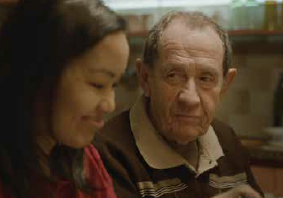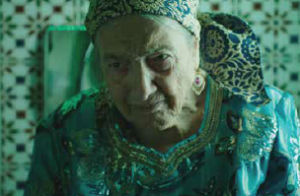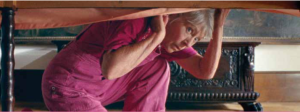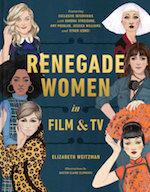Tag : film
August 19, 2020 by admin
Black Jewish Women Artists You Should Know…Rachel Harrison-Gordon
Art–whether it be dancing, painting, drawing, film–creates a space for self-examination, helping us to envision possible futures, and better versions of ourselves. And the Jewish month of Elul is traditionally an opportunity for introspection before the High Holidays of Rosh Hashanah and Yom Kippur.
Recognizing the power of art to be transformative, Lilith is highlighting Black Jewish women artists in this time leading up to and through Elul. On Lilith’s platforms you’ll have a chance to experience, share, buy and celebrate their work.
You can also participate by letting us know (at info@Lilith.org) Black Jewish women creators we should include!
—
Rachel Harrison-Gordon is an MFA/MBA candidate at NYU Tisch/Stern and a Sundance 2020 Blackhouse Fellow. Rachel’s interest in storytelling evolved through pursuits of perspectives in journalism and in government. She has studied people through quantitative behavioral data and through their stories, and hopes to create films, commercials and music videos that highlight the different ways people come of age. Her work challenges expectations of race, family and addiction.
Prior to NYU, she served as a Presidential Innovation Fellow for the Obama Administration, learning about Veterans and their experience returning home. She worked as a data analyst within a consumer insights group at The New York Times. Rachel graduated from the University of Pennsylvania School of Engineering, where she studied Mechanical Engineering. Broken Bird is Rachel’s first film.
 Instagram: @raawwwwrrrrrrrrr
Instagram: @raawwwwrrrrrrrrr
Website:rachelhg.com // brokenbirdfilm.com/
What’s the best gift you’ve ever given––or received?
Before I thought I could or would be a filmmaker, my partner and in-laws gifted me a beautiful photography camera. It changed the course of my life. When I would listen to music, I would always imagine the images that corresponded to those moments in my mind. Now I was able to create those images, and work the other way around. There’s something so empowering about learning something technical to create something new.
When was the last time you said no?
I was offered to produce a music video with a team who helped give me my start in filmmaking, and with an artist I love and would be eternally grateful to create with. Unfortunately due to COVID and some health circumstances, I had to turn down the opportunity. At least this time, I feel like I’m saying no because of something that matters, and not saying no because I don’t think I’m qualified, which is definitely something that has held me back.
 What is one question that you found yourself asking over and over again this year? What version of an answer are you living your way into?
What is one question that you found yourself asking over and over again this year? What version of an answer are you living your way into?
I used to ask “why does no one hear me? Listen to me?” I’ve found a way to be seen and heard, and to not place so much emphasis on the people who choose not to. I am no longer expending energy on people who refuse to look inside themselves and admit the pain they cause with their limited view of the world.
What is something you need to say? To whom?
To the Black girls everywhere, to the mixed girls, to the Black-Jewish girls – your life is special and valid. People will try to put you into a box so their world-view isn’t shook. Don’t let them do that, don’t let that effort subdue or censor who you are. We are all here and have something to offer. Believe in yourself, especially when you’re getting constant signals and discouragements not to.
- No Comments
July 27, 2020 by admin
See New Israeli Film Shorts •
The Gesher Multicultural Film Fund is the leading fund supporting independent short films produced in Israel as well as the best graduation films made in Israeli film schools. During these stay-at-home times, they are sharing a wide selection of short films by emerging filmmakers they have supported over the years. “The Caregiver” a film by Ruti Pri-Bar, is about an Indian male caregiver whose employer— an elderly Israeli man— replaces him with a woman. “The Youngest,” by Rachel Elizur, is about an ultra-Orthodox widow unwilling to let her daughter accept a marital match. “Offspring,” directed by Shirly Sasson-Ezer and Dana KeidarLevin is about a woman struggling to get pregnant who is dragged to a circumcision by her superstitious Bukharan grandmother. tportmarket.com/partners/gesher-vod


- No Comments
March 14, 2020 by Amy Stone
Rachel Cowan’s Last Year– ‘Dying Doesn’t Feel Like What I’m Doing’
None of us has died. No matter how close we’ve been to those who have died, it wasn’t us. Death is still a second-hand experience until you’re the one.
So when a loving friend and filmmaker recorded the last 15 months in the life of mindfulness teacher and rabbi Rachel Cowan, I wanted to learn what wisdom came to her with a diagnosis of brain cancer.
- 1 Comment
November 13, 2019 by Amy Stone
Our Reviewer’s Picks at the Other Israel Film Festival

Women directors are no longer a big deal, so take note of these four women-
made films worth seeing no matter who made them. Check the OIFF website for
additional films and events.
Breaking Bread (Director Beth Hawk; JCC Sunday, Nov 17, 4:30 pm) At last, food as the bridge to understanding in a film
festival that’s hungry for hope. Dr. Nof Atamna-Ismaeel was first Muslim Arab to
win Israel’s Master Chef competition. The microbiologist from an Arab town in
northern Israel is using her food festival for social change.
Border of Pain (Director Ruth Walk; international premiere JCC Wednesday,
Nov. 20, 6:15 pm) Food and medicine, two ways
to break down walls. The sturdy, head-covered Gaza and West Bank women
determined to get permission to enter Israel for life-saving hospital care. The
Israeli doctors and volunteers who are part of an elaborate health care
bureaucracy knitting together Israel and Palestinian Authority ministries. And the
amazing Dalia Bassa, health coordinator for Israel’s civil administration. Blonde
hair, pink shirt, driving from border crossings to hospitals, her cell phone never
stops ringing.
- No Comments
November 5, 2019 by admin
Ask Dr. Ruth •
As she approached her 90th birthday and showed no signs of slowing down, Dr. Ruth Westheimer, now 91, a Holocaust orphan who became America’s most famous sex therapist, became the subject of a new documentary film. With her diminutive frame, thick German accent and characteristically uninhibited approach to sex therapy and education, Dr. Ruth revisits in the film her painful past and unlikely path to a career at the forefront of the sexual revolution.
- No Comments
August 15, 2019 by admin
“Ask For Jane” Tells the Abortion Story You Never Heard, But Should Have
For those of us born at the tail end of the 20th century, a world without legal abortion is tough to imagine. Bluntly showing a society in which unwanted pregnancies can quickly become death sentences and where even talking about abortion can lead to jail time, newly released biopic “Ask for Jane” makes sure we know exactly what this world looked like.
The film, directed by Rachel Carey and released one short year after Lilly Rivlin’s documentary “Heather Booth: Changing the World,” tells the story of the Jane Collective, an underground, illegal abortion service run out of Chicago between 1968-1973. Created by a college student who connected pregnant women with abortion doctors through her dorm room phone, the “Janes” developed into a volunteer network dedicated to providing safe abortions to women at the lowest possible cost. In 1971, after discovering that one of their “doctors” faked having a medical license, a number of the Janes even became “abortionists” themselves, doing the procedure for whatever price each woman could afford to pay. The makeshift clinic was eventually raided in 1972 and led to the arrest of seven volunteers who would become infamous as the “Abortion 7.” Despite facing up to 110 years in prison, the Janes continued helping pregnant women while out on bail. All charges against them were dropped shortly after abortion was made legal nationwide. In the final years before Roe v. Wade was decided, the Janes provided 11,000 women with safe abortions.
Far from devolving into partisanship, “Ask for Jane” stresses that the right to abortion is imperative for every woman regardless of whether she is Democrat or Republican, Catholic or atheist. All women can find themselves pregnant when they don’t want to be. All women are on the losing side of the war. The film shows teenagers, rich Park Avenue wives, low-income workers, survivors of rape, college students, women of color, mothers—every imaginable type of woman in the clinic waiting room. Speaking at a talkback following a screening of the film in Manhattan, creator and star of “Ask for Jane” Cait Cortelyou pointed to this diversity as the most important aspect of the movie. “I was interested in humanizing those stories,” she said, “because I feel like a lot of the conversation has gotten away from the individuals who are affected by the policies that are made.”
Yet, beyond reinforcing the necessity of safe, legal abortion for all women and introducing audiences to a badass activist group that is ignored in high school history class for the sake of covering more white guys, “Ask for Jane” distinguishes itself by representing a brutal and holistic picture of women’s reproductive welfare that extends far past abortion itself.
The lack of knowledge surrounding sex, for instance, is consistently cited as a major cause of unplanned pregnancy throughout the film. One of the characters—all of whom are fictionalized—works at a Catholic high school where she smuggles sex ed pamphlets to students, raging that abstinence-only education leaves kids clueless and at risk. Today that simple fact remains true, with those schools and states teaching girls to keep their legs closed having higher teen pregnancy rates than their condom-wielding, pill-popping counterparts.
The overwhelmingly patriarchal nature of society at the time (today too, let’s be real) further stands as a clear impediment not only to women’s autonomy but also to their general health. A newly engaged character asks an elderly, male gynecologist for a birth control prescription. He refuses to give her one on the grounds of her unmarried status. Luckily, he assures her, if she returns with a husband who will give his permission, she can get the pill. Similarly, a pregnant mother of two learns that a tumor in her abdomen can be removed, but she runs the risk of losing her baby in the process. Though she immediately agrees to the surgery that will save her life, it’s not up to her. As the legal owner of her body, her husband gets to decide whether she lives or dies.
Today, in the midst of the most virulent wave of anti-abortion legislation since Roe v. Wade, “Ask for Jane” serves as a reminder that such a vicious restriction as the outlawing of abortion does not emerge in a vacuum and cannot be fought in isolation. Rather it is a by-product of a society run by and for men that considers the purpose of women to be childbearing. Period. Women are denied education regarding their own anatomy and safe sex. They are refused birth control. Men decide what women may or may not do with their bodies. It’s not just that abortion is illegal, it’s that all of society is built for women to have kids—whether they want to or not. And if there is a push to take us back to the days of criminalized abortion, there is a push to restore the larger social order that came with it, something that must be fought with the same fervor as anti-abortion legislation itself.
“Ask for Jane” is not a movie for viewers to leave behind in the theater with sticky floors and popcorn containers. Rather, it is the motivation for burnt-out activists to keep fighting in the face of crushing opposition. It is the hope that all women will unite on this issue and fight for the protection of legal. It is the source of anxiety propelling the idle to action, turning “heartbeat” bills and abortion-provider deserts from headlines on our phones to a bleak reality accessible even to those who never lived in a United States that criminalized abortion. And, most importantly, it is the game plan, reminding us to direct our energies not only to abortion, but to the availability of birth control, comprehensive sex ed, and the abolition of patriarchal culture. To keep the fight for women’s reproductive health on track, movies like “Ask for Jane” are crucial. In the words of Gloria Steinem herself: “It is a movie that should be seen by every American.”
- No Comments
July 9, 2019 by admin
Daria Martin: Tonight the World •
 An unusual new exhibition of works by artist Daria Martin explores the unconscious memories of her paternal grandmother, who fled the former Czechoslovakia during the Holocaust. Martin’s art springs from an extensive archive of dream diaries her grandmother created over a 35-year period, originally chronicled for the purposes of psychoanalysis. This multimedia exhibition includes two films, one created using computer gaming technology that takes users on a journey through a 3-D rendering of the villa in Brno as it appeared when the grandmother lived there, and another, with actors, that presents a reimagining of four of the grandmother’s dreams.
An unusual new exhibition of works by artist Daria Martin explores the unconscious memories of her paternal grandmother, who fled the former Czechoslovakia during the Holocaust. Martin’s art springs from an extensive archive of dream diaries her grandmother created over a 35-year period, originally chronicled for the purposes of psychoanalysis. This multimedia exhibition includes two films, one created using computer gaming technology that takes users on a journey through a 3-D rendering of the villa in Brno as it appeared when the grandmother lived there, and another, with actors, that presents a reimagining of four of the grandmother’s dreams.
The installation operates simultaneously as a portrait of Martin’s ancestor, a self-portrait, and an exploration of intolerance, migration, loss, resilience and intergenerational trauma. The exhibition was co-commissioned by Barbican Centre, London, and The Contemporary Jewish Museum in San Francisco where it is showing through February 19, 2020. thecjm.org/exhibitions/110
- No Comments
April 17, 2019 by Yona Zeldis McDonough
Golden Girls of the Silver Screen

Well told and illustrated with charm, Renegade Women is a coffee table book for our feminist pop cultural age. It offers more than 60 informative and whimsically illustrated portraits of female movers and shakers in the entertainment field.
Fiction Editor Yona Zeldis McDonough chats with author Elizabeth Weitzman about the importance of highlighting their impressive accomplishments.
- No Comments
April 12, 2019 by admin
A Film About Faith… Starring Jewish Men, Men and More Men
Comparing practices across religions can provide insights into customs and beliefs, and highlight our shared humanity. I approached the film “Sacred,” recently shown on PBS, expecting to be enlightened. A feature length documentary, it’s been shown at more than 75 film festivals around the world, had a week-long run at the Rubin Museum in NYC and numerous screenings at congregations, theaters and universities.
In many ways, “Sacred” does not disappoint. A travelogue of religious practices in over 25 countries, the film is a visually rich mosaic. The diverse and pluralistic material is treated with respect and even reverence, and the overall message is solid: there are a variety of ways to approach the spiritual, that there’s no one answer and no monopoly on truth.
- No Comments
April 12, 2018 by admin
Girls at Hasidic Summer Camp
Be on the lookout for Pearl Gluck’s Summer, a short film of sexual exploration set in a Hasidic sleepaway camp in the Catskills. Gluck, 45, went from growing up Hasidic in Borough Park, Brooklyn, to college at Brandeis, with a quirky feminist affection for her roots. At the film’s world premiere at the January 2018 New York Jewish Film Festival, she cheerfully admitted to autobiography in this film she wrote, directed and produced.
The 18-minute film captures the ferocious energy of a camp full of adolescent girls and the gentle secrecy of two friends’ illicit inquiry into a copy of Our Bodies, Ourselves. (Though with all the current complexities of “consent,” one girl’s pressuring another makes this reviewer a little uncomfortable.) The attractive young rebbetzin entrusted with the campers’ moral education stays on message: “You are always in the presence of God, but you are also always in the presence of matchmakers.… Above all, don’t mess up your chances for a good match.” Look for Summer, with score by The Klezmatics’ Lisa Gutkin, on the film festival circuit.
Gluck’s Hasidic filmic feminism goes back to Divan (2003/Netflix, Amazon, Fandor). It’s her own Hasidic tale, journeying through Hungary in search of the ancestral couch where revered rebbes slept. Not a one-note filmmaker, her latest film, The Turn Out, explores sex trafficking at America’s rural truck stops. More on Gluck’s films and contact information to arrange screenings, at palinkapictures.com.
- No Comments
 Please wait...
Please wait...